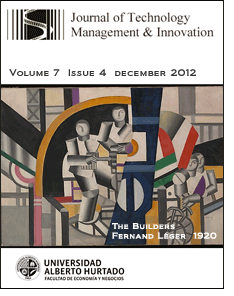Alignment of Quality Management in SMEs with the Market Performance
DOI:
https://doi.org/10.4067/S0718-27242012000400008Keywords:
quality management, market segment, competitiveness.Abstract
The purpose of this research is to relate competitiveness through productivity on Small and Medium Enterprises (SMEs) with the level of quality that these companies are and the market segment they serve. The methodology used was a multiple case study using questionnaires and systematic observations in SMEs. Results showed that the quality of the companies surveyed is determined by the market segment in which they operate. Quality management is based on the end customer and the view of entrepreneurs look beyond the premises of their companies. The importance of this research is to relate the market segment with the quality level used in SMEs, a strategy required for the current competitiveness.Downloads
References
AGUS, A. HASSAN, Z. (2011). Enhancing production performance and customer performance through total quality management: strategies for competitive advantage. Procedia, 2(4), pp. 1650-1666.
BETTS, A., CROOM, S., LU, D. (2011). Benchmark to escape from Lake Wobegon. Benchmarking:An International Journal, 8(5), pp. 733-744.
BRENDLER, E. BRANDLI, L. L. (2011). Integration of environmental management system in quality management system in a garment industry. Gestão & Produção. 18 (1 ), pp. 27-40.
BRUN, A., CASTELLI, C. (2008) Supply chain strategy in the fashion industry: Developing a portfolio model depending on product, retail channel and brand. International Journal Production Economics, 11(6), pp. 169–181.
CASTKA, P., BALZAROVA, M. (2008). The impact of ISO 9000 and ISO 14000 on standardisation of social responsibility-an inside perspective. International Journal Production Economics, 11 (3), pp. 74–87.
CIATO, F., CARIDI, M., CASTELLI, C., GOLINI, R. (2011). Supply chain management in the luxury industry: a fist classification of companies and their strategies. International Journal Production Economics, 13(3), pp. 622–622.
DAL FORNO, A. J., BUSON, M. A., SHUCH, C. G., FORCELLINI, F. A., FERREIRA, M. G. (2009). The process of product development from the perspective lean: the variable product benchmark lean. Revista Gestão Industrial, 5 (2), pp. 99-116.
FARRIS, A. J., EILEEN, M.V.A., DOOLEN, T.L., WORLEY, J. (2009). Critical success factors for human resource out-comes in Kaizen events: An empirical study. International Journal Production Economics, 11(7), pp. 42–65.
GARRO, A. (2011). New product demand forecasting and distribution optimization: a case study Zara. 194pp. Master of science in Mechanical Engineering – Sloan School of man- agement (MIT), Cambridge.
GLOVER, W.J., FARRIS, A. J., EILEEN, M.V.A., DOOLEN, T.L. (2011). Critical success factors for the sustainability of Kaizen event human resource outcomes: An empirical study. International Journal Production Economics, 13(2), pp. 197– 213.
GRAEL, P. F. F., OLIVEIRA, O. J. (2010). Certifiable environmental management systems and quality: practices for integration in the furniture sector. Revista Produção, 20(1), pp. 30-41.
HOLSCHBACH, E. HOFMANN, E. (2011). Exploring quality management for business services from a buyer’s perspective using multiple case study evidence. International Journal of Operations & Production Management, 31 (6), pp. 648-685.
HONARPOUR, A.; JUSOH, A.; NOR, K. (2012). Knowledge management, total quality management and innovation: A new look. Journal of Technology Management & Innovation, 7(3), pp. 22-31.
IEMI. (2011). Relatório setorial da indústria têxtil brasileira 2010. IEMI: São Paulo.
MANJUDAR, J.P., MANORAR, B.M. (2011). How to make quality circle a success in manufacturing industries. Asian Journal on Quality, 12 (3), p. 244-253.
MENEZES, L.M. (2012). Job satisfaction and quality management: an empirical analysis. International Journal of Operations & Production Management, 32 (3), pp. 308-328.
MIGUEL, P. A. C. (2012). Metodologia de pesquisa em en-genharia de produção e operações. 2º Ed. Rio de Janeiro: Elsevier: ABEPRO.
OUPARRA, N.S.; SY, M.V. (2012). Quality of Work Life Practices in a Multinational Company in Sydney, Australia. Procedia, 40(2), pp.116-121.
PALADINI, E. P. (2009). Gestão estratégica da qualidade: Princípios, métodos e processos. 2.ed. São Paulo: Atlas.
PHAN, A.C., ABDALLAH, A. B., MATSUI, Y. (2011). Quality management practices and competitive performance: Empirical evidence from Japanese manufacturing companies. International Journal Production Economics,13(3), pp.518-529.
REDE APL. Perfil do Arranjo Produtivo Local de bonés de Apucarana-PR. Disponível em: http://www.redeapl.pr.gov.br/arquivos/File/Peril_APL_Bone.Apucarana.pdf . [Acesso em May 26, 2011]
SADIKOGLU, E., ZEHIR, C. (2010). Investigating the effects of innovation and employee performance on the relationship between total quality management practices and firm performance: An empirical study of Turkish firms. International Journal Production Economics, 12(7), pp.13-26.
SANTOS,A. B.; MARTINS, M. F. (2010). Contribuições do seis sigma: estudos de caso em multinacionais. Revista Produção, 20(1), pp. 42-53, 2010.
SEN, A. (2008). The US fashion industry: a supply chain review. International Journal Production Economics, 11(4), pp. 571-593.
TADDESE, F., OSADA, H. (2010). Process Techno - innovation using TQM in developing countries empirical study of deming prize winners. Journal of Technology Management & Innovation, 5(2), pp. 47-65.
THOMASSEY, S. (2010). Sales forecasts in clothing industry: The key success factor supply chain management. International Journal of Products Economics. 12(8), pp. 470-483, 2010.
VECCHI, A.; BRENNAN, L. (2011). Quality management: a cross-cultural perspective based on the GLOBE framework. International Journal of Operations & Production Management, 31(5), pp. 527-553.
Downloads
Published
How to Cite
Issue
Section
License
Copyright (c) 2012 Journal of Technology Management & Innovation

This work is licensed under a Creative Commons Attribution-ShareAlike 4.0 International License.







